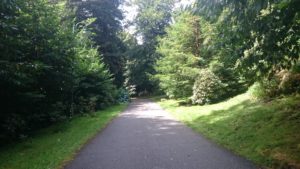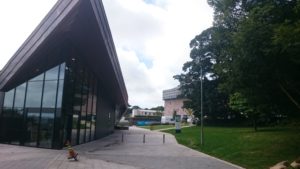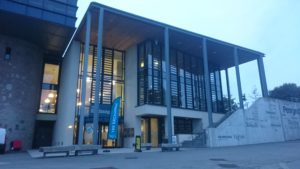I didn’t really decide to come to Cornwall – I originally applied for Streatham campus. I received an alternative offer between trips to visit family in Europe and a holiday in Scotland.
I did, luckily, find the time to come spend a night during the few days reserved for clearing students to come have a look. My brother and I grabbed a late train to the South West (by the skin of our teeth) and watched the countryside speed by with a mix of anticipation and anxiety. We landed in this strange land of rolling hills that dip into the ocean and bright yellow dairy only slightly ambivalent anymore about whether I should accept this offer or not. I know I made the right decision: Cornwall grows on you.
Living in Cornwall, if you’re from the countryside, may well be easier to adapt to, given that you’re not located in a city either. But if, like me, you usually feel most at ease when at least fifteen different apps can deliver food to where you live without your ever setting foot out of your own doorstep, it can be scary. Let me gently guide you out of the land of deliveroo, uberEats and instant gratification, and into a country of fresh air, delicious food, and an unusually high number of hipsters for such a rural area. (Supermarkets here are always fully stocked with avocados.)
The important facts to know are that buses cost £1 between Falmouth and campus, the surgery is in Penryn down a street to the right, Truro is the place to go for high street retail therapy and fried chicken is less a thing than fish and chips around here. But that’s the bare minimum you need to know to survive. Anyone who gets their degree here with only these facts will probably leave Cornwall at the end of three years and have nothing to show for having lived in one of the most beautiful places in this country. I was forewarned by an ambassador and my mentor – “there is one club here. One. You have to be sure you’re ok with that.” Honestly, I really am.
But here’s more: the Cornish like to take their time. It’s rewarding to be a part of their community, and it really teaches you to stop and admire the view every now and then. It is a diverse place: I’ve learned not to just remain sat on the bus between Falmouth and Penryn. I’ve been discovering, using my railcard (an essential item here), the wonders of Land’s End, Saint Ives, its beaches and its Tate museum, St Michael’s Mount (there is an outdoor succulent shop on the island. Hipster heaven.), the Eden Project and many, many lovely beaches.
Pasties are, of course, a local delicacy, but the true advantage of living outside of a big city is the local produce. You won’t find fresher fish or dairy a brighter yellow, and if you are vegetarian or vegan, you could go to the many farmers’ markets or country stores to source what suits you best.
I didn’t even have to go far to find out how beautiful it is here: even a walk around the hills around Penryn or Falmouth is unbelievably picturesque. I did this for the first time in February, when I was having a bit of a bad time – academic work was piling up and I was spending my birthday far from my family for the first time. The beautiful sea views and lights shining from the town cheered me right up.
So although I never really chose to come here, it’s really become a part of my identity. It suits me, my friends are here and I feel at home – I belong here now. For someone who has moved around almost every other year, that’s a rather big deal.





